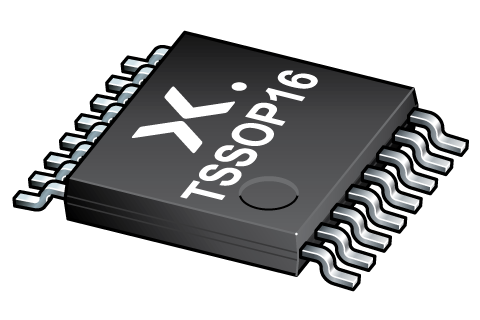Orderable parts
| Type number | Orderable part number | Ordering code (12NC) | Package | Buy from distributors |
|---|---|---|---|---|
| HEF40175BTT | HEF40175BTT,118 | 935294421118 | SOT403-1 | Order product |

Register once, drag and drop ECAD models into your CAD tool and speed up your design.
Click here for more informationQuad D-type flip-flop
The HEF40175B is a quad positive edge triggered D-type flip-flop with four data (Dn) inputs, common clock (CP) and asynchronous master reset (MR) inputs, and complementary Qn and Qn outputs. When MR is HIGH data at the D-input that meets the set-up and hold time requirements on the LOW-to-HIGH clock transition will be stored in the flip-flop and appear at the Q output. When LOW, MR resets all flip-flops (Qn = LOW, Qn = HIGH), independent of CP and Dn. Inputs include clamp diodes. This enables the use of current limiting resistors to interface inputs to voltages in excess of VDD.
Wide supply voltage range from 3.0 V to 15.0 V
CMOS low power dissipation
High noise immunity
Fully static operation
5 V, 10 V, and 15 V parametric ratings
Standardized symmetrical output characteristics
Complies with JEDEC standard JESD 13-B
HBM: ANSI/ESDA/JEDEC JS-001 class 2 exceeds 2000 V
CDM: ANSI/ESDA/JEDEC JS-002 class C3 exceeds 1000 V
Specified from -40 °C to +85°C and from -40 °C to +125 °C
Shift registers
Buffer/storage register
Pattern generator
| Type number | VCC (V) | Logic switching levels | Output drive capability (mA) | tpd (ns) | fmax (MHz) | Power dissipation considerations | Tamb (°C) | Rth(j-a) (K/W) | Ψth(j-top) (K/W) | Rth(j-c) (K/W) | Package name |
|---|---|---|---|---|---|---|---|---|---|---|---|
| HEF40175BTT | 3.0 - 15 | CMOS | ± 2.4 | 25 | 45 | low | -40~85 | 115 | 2.2 | 43.2 | TSSOP16 |
| Model Name | Description |
|---|---|
|
|
| Type number | Orderable part number, (Ordering code (12NC)) | Status | Marking | Package | Package information | Reflow-/Wave soldering | Packing |
|---|---|---|---|---|---|---|---|
| HEF40175BTT | HEF40175BTT,118 (935294421118) |
Active | HF40175 |

TSSOP16 (SOT403-1) |
SOT403-1 |
SSOP-TSSOP-VSO-WAVE
|
SOT403-1_118 |
| Type number | Orderable part number | Chemical content | RoHS | RHF-indicator |
|---|---|---|---|---|
| HEF40175BTT | HEF40175BTT,118 | HEF40175BTT |
|
|
| File name | Title | Type | Date |
|---|---|---|---|
| HEF40175B | Quad D-type flip-flop | Data sheet | 2024-08-08 |
| AN11051 | Pin FMEA HEF4000 family | Application note | 2019-01-09 |
| SOT403-1 | 3D model for products with SOT403-1 package | Design support | 2020-01-22 |
| Nexperia_package_poster | Nexperia package poster | Leaflet | 2020-05-15 |
| TSSOP16_SOT403-1_mk | plastic, thin shrink small outline package; 16 leads; 0.65 mm pitch; 5 mm x 4.4 mm x 1.1 mm body | Marcom graphics | 2017-01-28 |
| SOT403-1 | plastic, thin shrink small outline package; 16 leads; 5 mm x 4.4 mm x 1.2 mm body | Package information | 2023-11-08 |
| SOT403-1_118 | TSSOP16; Reel pack for SMD, 13"; Q1/T1 product orientation | Packing information | 2020-04-21 |
| HEF40175BTT_Nexperia_Product_Reliability | HEF40175BTT Nexperia Product Reliability | Quality document | 2025-03-20 |
| SSOP-TSSOP-VSO-WAVE | Footprint for wave soldering | Wave soldering | 2009-10-08 |
If you are in need of design/technical support, let us know and fill in the answer form we'll get back to you shortly.
The Nexperia Longevity Program is aimed to provide our customers information from time to time about the expected time that our products can be ordered. The NLP is reviewed and updated regularly by our Executive Management Team. View our longevity program here.
| File name | Title | Type | Date |
|---|---|---|---|
| SOT403-1 | 3D model for products with SOT403-1 package | Design support | 2020-01-22 |
| Model Name | Description |
|---|---|
|
|
| Type number | Orderable part number | Ordering code (12NC) | Status | Packing | Packing Quantity | Buy online |
|---|---|---|---|---|---|---|
| HEF40175BTT | HEF40175BTT,118 | 935294421118 | Active | SOT403-1_118 | 2,500 |
|
As a Nexperia customer you can order samples via our sales organization.
If you do not have a direct account with Nexperia our network of global and regional distributors is available and equipped to support you with Nexperia samples. Check out the list of official distributors.
The interactive datasheets are based on the Nexperia MOSFET precision electrothermal models. With our interactive datasheets you can simply specify your own conditions interactively. Start by changing the values of the conditions. You can do this by using the sliders in the condition fields. By dragging the sliders you will see how the MOSFET will perform at the new conditions set.